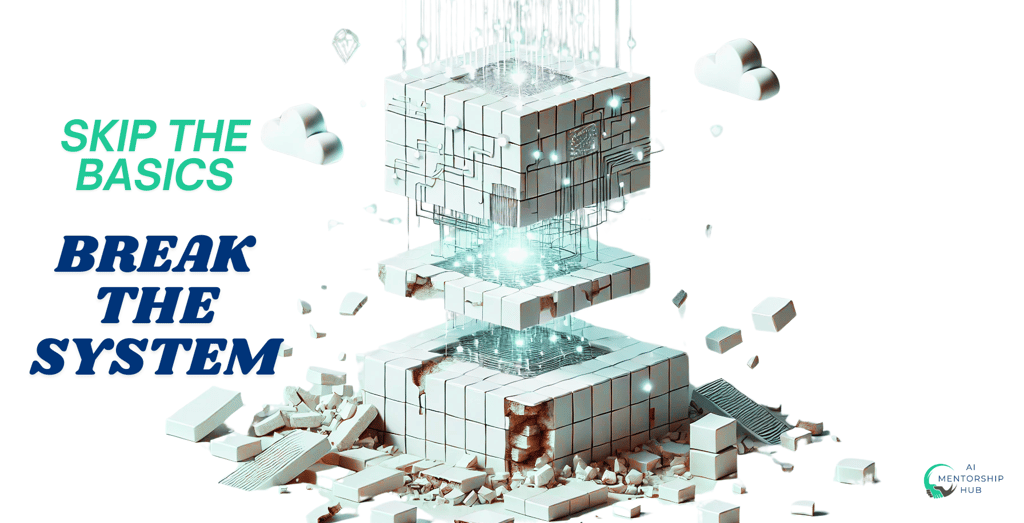Stop Skipping the Boring Stuff: How Ignoring the Basics Ruins Your AI Foundation
In the rush to build AI apps and show off projects, most learners skip the very thing that makes it all work — the basics. Clean loops, logic building, writing functions, understanding errors — none of it sounds impressive, but all of it is essential. What looks like speed is often just stacking confusion. And when things finally break — in a real project or an interview — it’s not because learners didn’t work hard. It’s because they built everything on an unstable core.
Rakesh Arya
6/12/20254 min read


Everyone Wants to Build the Castle — No One Wants to Lay the Bricks
You’ve probably seen this unfold dozens of times—maybe you’ve even lived it.
A student dives into LangChain, ChatGPT APIs, or some flashy LLM project. Within days, they post a working demo online. It looks impressive. There’s a slick UI, a few responses from the model, and the proud caption: “My First AI App.”
But when something breaks, everything falls apart.
The input throws an error. A function doesn’t behave as expected. They try to tweak a few lines, and suddenly, nothing works. There’s panic, followed by frustration, and finally the realization: they don’t really understand what’s going on under the hood.
In the race to do something impressive, the basics were ignored.
And this is the silent failure in many learners’ journey—trying to build without ever laying the foundation. Python fundamentals, logic building, writing clean code—none of it seems important until it’s the only thing that matters.
The Shortcut That’s Slowing You Down
Today’s learners aren’t lazy. They’re doing a lot—maybe too much.
One day it's a YouTube tutorial on AI chatbots. The next, it’s a Hugging Face model deployment course. Their bookmarks are full of advanced articles and cloned GitHub projects. The learning never stops, yet the understanding never deepens.
This is what the modern shortcut looks like:
Skipping core Python in favor of frameworks
Using ChatGPT to write entire blocks of logic
Following project-based content without reflection
Watching instead of doing
Copying without questioning
It creates the illusion of speed, but it’s a trap. Without applying what you learn—without struggling through the “why” behind each concept—you’re stacking complexity on confusion.
The Basics You Keep Avoiding
Let’s be honest—this is the part no one wants to sit with.
The things that feel too slow, too simple, or too old-school:
Writing a loop from scratch
Understanding what makes a function reusable
Learning how lists differ from dictionaries
Practicing string operations
Handling errors without blindly Googling
These aren’t checklist items—they are the skillset. Without them, your pandas and NumPy knowledge won’t help you debug a broken script. Your LangChain app will crash when the input format changes. Your ChatGPT clone will stop working when you forget to handle an edge case.
Tools and libraries change. But the thinking behind problem-solving, the ability to structure clean code, and the understanding of logic flow—these stay with you throughout your career.
Ignore them now, and you’ll keep hitting invisible walls later.
When the Cracks Begin to Show
It doesn't happen immediately.
In the beginning, things work. You follow tutorials, run the code, even deploy a few apps. It all feels smooth—until you’re asked to build something original, explain your code, or contribute to a real-world project.
That’s when it hits.
You realize you don’t know how to debug without ChatGPT. You can’t write a basic Python function without checking Stack Overflow. You avoid questions that go even slightly below the surface.
This is where many learners lose confidence.
They don’t fail because they didn’t work hard.
They fail because they built everything on an unstable core.
The basics they once skipped quietly come back—not as concepts, but as obstacles. And by then, they’ve become roadblocks.
You Don’t Need to Start Over — But You Do Need to Slow Down
There’s a common fear among learners who realize their foundation is weak:
“I’ve wasted so much time. Do I have to go back to the beginning?”
The answer is no. You don’t need to throw everything away. You don’t need to stop working on interesting projects or ignore the tools you enjoy. But you do need to press pause and repair the base—before you stack anything more on top of it.
Start by simplifying. Instead of jumping into another advanced course, spend time with plain Python. Open a blank file and build something small from scratch. Not with tutorials. Not with copied code. Just you, your logic, and your editor.
Can you take a list of numbers and return only the even ones?
Can you read a file and summarize the content without using libraries?
Can you explain what each line of your own code does?
If the answer is no, that’s where your time is best spent.
It’s not about being perfect—it’s about being grounded. Once you build the confidence to solve small problems independently, you’ll notice something powerful: the big problems stop feeling so overwhelming.
The same libraries, the same projects, the same concepts—they all start to make more sense. Because this time, you’re not following blindly. You’re thinking clearly.
What No One Applauds Is What Actually Matters
In the world of AI learning, there’s always noise.
Another viral tutorial. Another “10x engineer” on Twitter. Another flashy project with a fancy interface.
But here’s what no one shows you: the hours spent debugging a loop.
The frustration of tracing a logic error through five lines of code.
The time spent understanding why your function returns None instead of the expected output.
These things won’t make it to your LinkedIn.
But they will make you competent.
They will make you confident.
Everyone wants to build the next great AI application.
But only a few are willing to slow down, sit with the boring stuff, and truly understand how to think in code.
And in the end, those few are the ones who build things that don’t just run — they last.
So if you’ve been skipping the boring stuff, this is your moment to stop, go back, and lay the bricks properly.
Because when the foundation is strong, everything else becomes easier.
